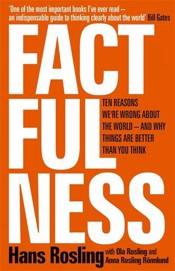Factfulness: Ten Reasons We’re Wrong About the World – and Why Things Are Better Than You Think

Hans Rosling is a legend in statistics and health research. He died a few years ago, but his YouTube videos and TED talks live on. He studied health and living trends around the world, and created a unique way to visualize them. His talks usually involve him pointing at bubbles which move around a screen.
This book was his last project. He died in the middle of it, and it was finished by his son and daughter-in-law who were his research partners.
The book explains why we think wrongly about the world. We have a bunch of cognitive fallacies that we slip into when we think beyond our borders. The world is actually doing much better than we think it is, and Rosling explains why we think it’s not.
We assume every trend line continues straight
We hold on to old ways of thinking about other cultures, even though they’re always changing (Africa has a middle class, it turns out)
Our default stance about the state of the world is negative
We divide the world into extremes, when most things are in the middle
It’s a lovely book, and in an afterward, Rosling’s co-authors discuss how it was his life goal and he was literally working on it up until the day he passed away from pancreatic cancer. He had pages from the manuscript with him in his deathbed.
It reminded me of Steven Pinker’s “Enlightment Now” in the sense that it tries to repeal our notions that the world is a never-ending series of disasters, when, in fact, other than climate change and obesity rates (and, depending on your position, church-going rates), the state of the world actually keeps getting better every year.
Book Info
- I have read this book. According to my records, I completed it on .
- A hardcover copy of this book is currently in my home library.